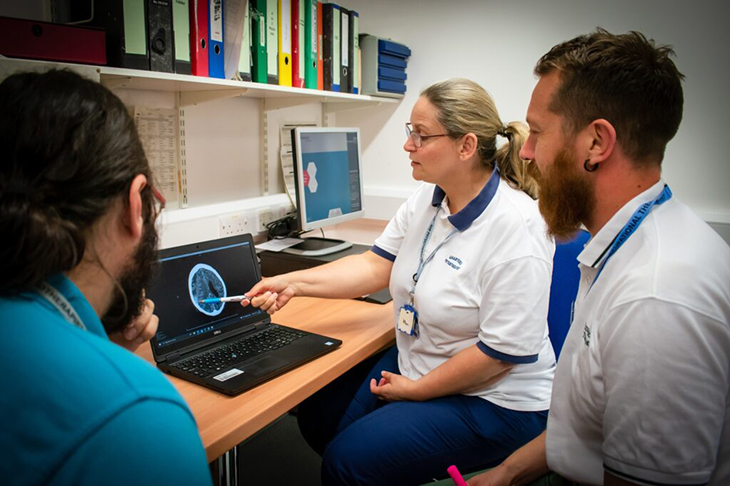
Trauma patients are those that have suffered and survived some of the most severe injuries that the NHS treats. These are people who have been involved in vehicle collisions, who have been shot or stabbed or who have experienced other severe, life-changing injuries that have required serious and often complex surgery to save their lives – but what happens next?
We talk to Kirsti Bennett-Koster, Clinical Lead Physiotherapist in our after trauma team, about her team’s work in helping these patients return to their lives following their injuries.
“These patients have many complex needs,” Kirsti explains. “An individual patient may have suffered a brain injury, a spinal injury, have needed abdominal surgery or have needed treatment for broken or even missing limbs. The after trauma team works with our ward teams to coordinate and deliver the wide range of complex care that these patients need to be able to return to their lives.”
The complicated nature of these patients’ needs is reflected in the scope of the expertise of the team. The after trauma team is made up of rehabilitation consultant therapists, specialist acquired brain injury (ABI) occupational therapists, specialist orthopaedic physiotherapists, specialist neurological physiotherapists, and orthopaedic specialist nurse practitioners as well as the essential rehabilitation, trauma, audit and research network (TARN) and trauma nurse service coordinators who help manage the extensive, interlinked treatment pathways. The extreme nature of trauma patients’ injuries can also have a serious psychological impact on them, so the team also works closely with the clinical psychologists attached to the critical care unit.
Many of the patients the team see have had their initial urgent treatment at the Major Trauma Centre for the region, based at the Royal Sussex Hospital in Brighton, and are transferred back to Conquest or Eastbourne District General Hospital for ongoing care.
“We speak to the Major Trauma Centre every week to make sure we are working closely with them, as well as a few days before a patient is transferred back to us,” says Kirsti. “It means that we can make sure that the patient can be admitted smoothly, even when we are busy. That’s really important because of the level of care and support that they need.”
As well as transfers from the Major Trauma Centre, the team also looks after other patients who need complex, trauma-related care.
“We can support any patients with complex, trauma-related needs – even if they haven’t come through the major trauma pathway. We take patients from wards and from the surgical assessment unit, as well as the intensive care, high dependency and critical care units,” says Kirsti.
Patients who have suffered trauma often have difficult prognoses. The care provided by the after trauma team can address the range of needs patients may have and provide a road map to recovery – even if their injuries are life-changing ones.
“Our aim is to get patients up, get them going and get them home, but that isn’t always straightforward,” continues Kirsti. “It’s about helping these patients achieve the best outcome possible for their situation. Many can go back to their lives with comparatively few changes, but that’s often not the case. For some patients, even being able to roll themselves over in bed may now be a challenge – but we’re here to help them help themselves as much as we can.”
The unique role of the after trauma team means that they are able to see patients who wouldn’t be suitable for other teams.
“Patients who have suffered brain injuries often aren’t fully aware of their situation and may not be able to engage with conventional rehabilitation and therapy,” says Kirsti. “Our team can support these patients, as well as those with other significant impairments – up to and including comatose patients.”
